|

Stones of various kinds and sizes have been invested with sacredness
from the earliest times. The worship of stones can be found in most
ancient cultures, while sacred stones can be found in most of the
world's religions.
According to Pausanias (VII, 24. 4) [see BIBLIOGRAPHY], In
olden times all the Greeks worshipped unwrought stones instead of
images and describes thirty square stones near a spring sacred to
Hermes [cf. Water and the Sacred] at Pharae in Greece.
|
 |
Beginning as early as 5000
BCE, large stones (megaliths - Greek mega, great, and lithos,
stone), either unwrought or roughly worked were erected across
prehistoric Europe to stand in lines or in circles (such as at
Stonehenge in England), or otherwise arranged in conjunction
with earthworks usually identified as burial mounds (such as at
Newgrange
in Ireland).
Little is known the
purpose or meaning of these megalithic constructions, but it is
universally agreed that they mark or embellish a sacred place in the
landscape. |
Examples of megalithism can also found in countries around the world,
such as the Beforo monument near Bouar in the Central
African Republic, the Tatetsuki stone circles standing
the summit of a tumulus at Okayama in Japan, and the moai
statues on ceremonial platforms on Easter Island [see
Jean-Pierre Mohen in the BIBLIOGRAPHY].
The moving and arranging of massive stones into a building or some
other configuration in a sacred context also characterizes many
early cultures around the globe, from the Inca in South America, to
the Egyptians and Mycenaeans.
Smaller individual stones can also become invested with the sacred.
The Stone of Scone, also known as the Coronation Stone
or the Stone of Destiny, until very recently rested on a shelf
beneath the seat of the Coronation Chair in Westminster Abbey in
London (it has now been returned to Scotland [see The Stone of
Destiny].
It is said that the stone could identify a rightful ruler
of the country by emitting a loud cry. Since the 13th century, every
British king or queen (except for the first Mary) has been crowned
monarch while seated in this chair over this stone. The stone had
been brought to London by order of King Edward I from Scotland in
1297. In Scotland the stone had been kept at Scone Palace in Perthshire where 34 successive Scottish kings had been crowned while
seated upon it.
According to tradition,
the stone had been brought to Scotland from Ireland where, up to
that time the newly crowned kings of Ireland had been crowned upon
it on the
Hill of Tara. Legend further explains that the stone had
come to Ireland from Judah in the 4th century BCE when the daughter
of the last king of Judah married into the Irish royal family.
Previously, the stone had been kept in the Temple of Jerusalem
(cf Dome of the Rock) when the kings of Judah had been crowned upon
it.
Traditionally, the stone is believed to be that which Jacob used
as a pillow when he had his dream of angels at Bethel.
Another example of a holy stone is the very sacred Black Stone
(reddish black, with some red and yellow particles ) inside the holy
shrine of
the Ka'ba [1. Ka'ba] at Mecca.
It is thought that the
Black Stone, now in pieces (three large parts, with smaller
fragments which are tied together with a silver band), may be a
meteor, or a piece of lava, or a piece of basalt. Its original
diameter is estimated to have been 30 cm. Besides the Black Stone,
built into the western corner of the Ka'ba is less sacred Stone of Good Fortune.
Stones and rocks in Japan were initially seen as symbols of
mononoke
(supernatural forces which permeate matter and space). Later,
an abstract, undifferentiated mononoke was replaced by more
definite animistic deities which resided in the stones and rocks.
These rock abodes are called iwakura.
All over the precinct
of the Shrine at Ise are rocks and stones which are venerated as the
abodes of deities, such as the subsidiary shrine at the Naiku called
Takimatsuri-no-kami. Elsewhere in Japan are many stones and
stone arrangements representing the male and female principle, such
as the stone circle at Oyu in Akita Prefecture in Northeastern
Japan.
The emotional attachment to natural stones, originally
religion-inspired, has persisted in Japan and is manifest today in
the creation of richly symbolic and spiritual stone gardens.

Tiffiney Whitmire
"All things throughout our
universe seem to follow the same fundamental blueprint or geometric
patterns. These geometrical archetypes, which reveal to us the
nature of each form and its virational resonances.
They are also
symbolic of the underlying metaphysical principle of the inseperable
relationship of the part to the whole. It is this principle of
oneness underlying all geometry that permeates the architecture of
all inseparability and union provides us with a continuous reminder
of our relationship to the whole - a blueprint for the mind to the
sacred foundation of all things created."
We call this blueprint "Sacred
Geometry".
|
Sacred Geometry is a term
that is used by archaeologists, anthropologists, and geometricians.
It includes the religious, philosophical, and spiritual beliefs that
have surrounded geometry in many various cultures throughout
history.
It covers Pythagorean geometry as well as the relationships
between organic curves and logarithmic curves.
The "sacred" aspect of
geometry has evolved as a result of different cultures. I have
provided five different views of how different cultures have made
geometry become sacred. Later, I will explain the meaning of certain
numbers, as they play an important role in sacred geometry.
A few
examples of sacred sites will also be provided. These examples will
provide you with a real sense of how sacred geometry is used in
sacred sites. |

Flower of Life |
1. The Ancient
Greeks
The ancient Greeks used certain geometrically-derived ratios. In this
culture the cube traditionally symbolized kingship and earthy
foundations. The Golden Section traditionally symbolized philosophy
and wisdom. Therefore, if a building was dedicated to a king it
would bear traces of cubic geometry and a building dedicated to a
heavenly god would be constructed using Golden Section proportions.
The term "Golden
Proportion" is historically the unique geometric proportion of two
terms and it is designated by the 21st letter of the Greek alphabet
- phi. Phi was known by cultures much older than the Greek. The
three-term proportion is a:b :: b:c. That is, a is related to b as b
is related to c.
|
However, within the
three-term continuous proportion there is a special sub-set where
the third term is equal to the first term plus the second term, a:b
:: b:(a+b), so that only two terms, a and b, are found in the
three-term proportion.
This is called
Phi, the Golden Proportion.
-
"The fact that it is a
three-term proportion constructed from two terms is its first
distinguishing characteristic, and is parallel with the first
mystery of the Holy Trinity : the Three that are Two." (Lawlor 45)
-
"The Golden Proportion
represents indisputable proportional evidence of the possibility of
a conscious evolution as well as of an evolution of consciousness."
(Lawlor 47)
|
 |
The Golden Proportion is not an ordinary ratio. It is found naturally
in nature. Its specific ratio is 1.618. For example, it describes
the spiral of seeds in sunflowers and the shape of nautilus shells.
2. The Hindus
Before the Hindus erect any type of building, large or small, for
religious purposes they first perform a simple geometric
construction on the ground. This means that they construct a square
from establishing due East and West. It is from this square that
they lay out the entire building. The geometric construction is
associated by prayers and religious observances.
3. The Christians
The cross is used as the major emblem for the Christian religion. In
geometrical terms the cross, elaborated in the Medieval period, is
the form of an unfolded cube. It was also associated with kingship.
Many of the Gothic churches were built by proportions derived from
the geometry inherent in the cube or the double-cube. Many Christian
churches are still built in this form today.
4. The Ancient Egyptians
The ancient Egyptians used regular polygons in their construction, but
discovered that these polygons could be increased while keeping the
ratio of their sides by the addition of a strictly constructed area.
This was named the "gnomon" by the Greeks. The god Osiris was given
the recognition for the concept of the ratio-retaining expansion of
a rectangular area. Egyptians also used the square as a symbol of
kingship.
5. The Discovery of Jay Hambidge
Jay Hambidge was an art historian at Yale during the 1920's. He
discovered that the spirals on the Ionic column capitals of ancient
Greek temples were laid out by the "whirling rectangle" method for
creation of a logarithmic spiral. He did not find any "sacred
meaning" for the logarithmic spiral form of the Ionic column
capital. However, he did find that the Greek architects purposely
constructed their temples according to "whirling rectangle"
geometric ratios. Click here for image.

"Mathematics, as the basis of all science, is itself a universal
symbolism, a language into which all knowledge is eventually
translated and rendered communicable. The key to all knowledge is in
the science of numbers."
(Sepharial 24)
One
One symbolizes manifestation, assertion, the ego, selfhood and
isolation. In the philosophical sense, it represents the synthesis
and fundamental unity of things. In a religious sense, it represents
the lord. In a material sense, it represents the individual. It is
the symbol of the Sun.
Two
Two symbolizes plus and minus, active and passive, male and female,
positive and negative and so on. It stands for the dualism of
manifested life-God and Nature. It denotes agreement and separation.
Three
Three symbolizes the trinity of life, substance, and intelligence, of
force, matter, and consciousness. The family-father, mother, and
child.
Four
Four is the number of reality and concretion. It is the cube or the
square. It symbolizes the cross, segmentation, partition, order, and
classification.
Five
Five represents expansion. It symbolizes inclusiveness, comprehension,
understanding, judgment, reason, and logic.
Six
Six is the number of cooperation. It symbolizes marriage, a link, and
connection. Six is the inner action of the spiritual and material.
Six also represents art, music, dancing.
Seven
Seven is the number of completion. It represents time, space,
duration, and distance. It also represents old age, death, or
endurance, and immortality.
Eight
Eight is the number of dissolution. It denotes the law of cyclic
evolution, the breaking back of the natural to the spiritual.
Nine
Nine is the number of regeneration. A new birth. It represents
spirituality, premonition, and voyaging. It also represents
penetration, strife, energy, and anger.
| |
 |
|
The superficial equivalents of the sphere, cone and cube are the
circle, the triangle, and the square.
These figures, used in
symbolical thought, represent states of consciousness. These figures
are related to the numbers 1, 3, 4, which denote God, Humanity, and
Nature. One Being is represented as spirit, soul and body.
All geometrical relations are expressions of numerical ratios.
"...we
give natural assent to the power of numbers on which, in the
Pythagorean concept, the universe is founded."
(Sepharial 19)
The circles represents the sun and relates the natural aspects with
the spiritual. There is only one sun and therefore, one God who is
the universal lord. (The number one.)
Numbers are also associated with colors:
1 - White
2 - Yellow or cream
3 - Violet
4 - Orange or ruddy gold
5 - Indigo
or dark blue
6 - Pale blue or turquoise
7 - Silver or opalescence
8 -
Black or deep brown
9- Red or crimson
Examples:
|
Parthenon
The Parthenon was created by the Greeks. The Greeks believed that
everything, form the human body to the entire cosmos, was governed
by an order accessible to human reason.
The Parthenon was created as a temple for Athena Parthenos. It is located at the top of the Acropolis
of Athens. It was built to house a huge gold and ivory statue of the
goddess Athena. |
 |
The Parthenon is known as a geometrical masterpiece. It
is very pleasing to the eye due to the unique architecture. The
lines that are perceived as horizontals in fact are curved upward in
the middle. The platform upon which the columns of the temple stand
is slightly curved on all four sides. All of the columns are tilted
inward slightly, and are placed closer together toward the corners
of the building.
The geometrical aspect of the Parthenon is also very
interesting. If you add the number of Columns on the front and then
multiply them by 2 and add 1 you will get the number of columns on
each side. (8x2 = 16, 16+1 = 17) This is said to be geometrically
proportional. It is interesting that the number of columns chosen
for the front was eight.
Eight also represents the infinity symbol and looks like
a spiral. The spiral is important when discussing aspects of the
Golden Mean because the spiral helps describe the Golden Mean
logarithmic spiral. I have previously given the sunflower as
an example. The sunflower has 55 clockwise spirals overlaid onto
either 34 or 89 counterclockwise spirals. We recognize these numbers
as part of the Fibonacci Series, which is generated by Phi.
|
 |
Newgrange, Ireland
Newgrange was built around 3,200 BCE. It is a circular mound of earth
and stone and is about 250 feet in diameter.
The interior is solid, but there is a single stone-lined passage
that is 62 feet long and 3 feet wide.
This passage terminates close to the center of the mound in a main
chamber with a corbelled vault 20 feet high and three recessed
chambers. |
The entrance of Newgrange incorporates a "roof box" that
allows the sun, at sunrise on the morning of the winter solstice on
December 21, to enter the interior. The sun penetrates the full
length of the interior passage all the way to the main chamber.
It is interesting to me that Newgrange was choosen to be
a circle and that the sun plays a very important role in its
architecture. As I have stated previously, The circle represents the
sun and relates the natural aspects with the spiritual. There is
only one sun and therefore, one God who is the universal lord. This
also represents the number one.
|
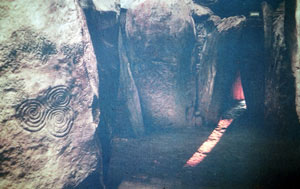
|
(top) photograph showing sunlight shining through the "roof
box"
(right) photograph showing sunlight entering the main chamber |
|
 |
Bibliography
-
Sepharial,The Kabala of Numbers,California: Newcastle
Publishing Co. Inc.,1974.
-
Lawlor, Robert,Sacred Geometry, New York: Crossroad, 1982.
-
Schimmel, Annemarie, The Mystery of Numbers, New York: Oxford
University Press, 1993.

Each lightSource image is fully animated
and utilizes 6000 colors. At normal speed (suitable for meditation)
it takes about ten minutes for an image to unfold its full range of
colors.
These thumbnails and screenshots are instant snapshots of the images
captured in a single moment, and each is displayed here in only 256
colors.
|
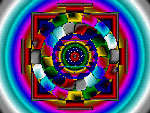
The Sri Yantra
|

Icosidodecahedron and Pentagonal Star |
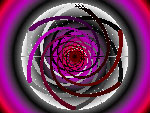
Golden Ratio Spirals
|

Tree of Life superimposed with Seed of Life |
|

Harmonics of Music with 13 Strand DNA |

Flower of Life with 2nd Harmonic Overlay |

Electromagnetic Field of the Human Merkaba |

The Endless Knot
|
|

Torus
|

Metatron's Cube
|

Ankhs (ansate cross) and the Seed of Life |

Sacred Heart
|
|

Vesica Piscis |
Sacred Geometry is the blueprint of Creation and
the genesis of all form. It is an ancient science that explores and
explains the energy patterns that create and unify all things and
reveals the precise way that the energy of Creation organizes
itself.
On every scale, every natural pattern of growth or movement
conforms inevitably to one or more geometric shapes.
As you enter the world of Sacred Geometry you begin to
see as never before the wonderfully patterned beauty of Creation.
The molecules of our DNA, the cornea of our eye, snow
flakes, pine cones, flower petals, diamond crystals, the branching
of trees, a nautilus shell, the star we spin around, the galaxy we
spiral within, the air we breathe, and all life forms as we know
them emerge out of timeless geometric codes.
Viewing and
contemplating these codes allow us to gaze directly at the lines on
the face of deep wisdom and offers up a glimpse into the inner
workings of the Universal Mind and the Universe itself.
The ancients believed that the experience of Sacred Geometry
was essential to the education of the soul. They knew that these
patterns and codes were symbolic of our own inner realm and the
subtle structure of awareness.
To them the “sacred” had particular
significance involving consciousness and the profound mystery of
awareness … the ultimate sacred wonder. Sacred Geometry takes on
another whole level of significance when grounded in the experience
of self-awareness.
The gift of light-Source is that it
actually allows you to experience that essential self within the
designs of pure Source energy.
As the blueprints literally come to
life before your eyes, you are propelled into ecstatic play with the
very the heart of Creation.

Each of the thirteen images featured represents a complex melding of
sacred geometric elements with a state-of-the-art media realization
into complex, flowingly animated art. Exponential combinations of
color palettes, images and unlimited choices of music and sound
create unique, unparalleled experiences.
Embedded in these experiences are the properties associated with each
geometry. Also, there is always an experiential and emotional aspect
associated with every sacred geometrical form. These particular
aspects become more apparent over time. In the end, keep only what
your personal experience validates.
Sacred Geometry Forms Properties Associated with the Form
|
1. Torus |
 |
The first shape to emerge out of the genesis pattern. It governs many
aspects of life including the human heart with its seven muscles
that form a torus. The torus is literally around all life forms, all
atoms, and all cosmic bodies such as planets, stars and galaxies. It
is the primary shape in existence.
|
2. Vesica Piscis |
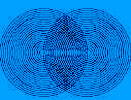 |
The crucible of the creating process. An opening to the womb from
which all geometric forms are born. A symbol of the fusion of
opposites and a passageway through the world’s apparent polarities.
The geometric image through which light was born. Also the geometry
for the human eye.
|
3. Flower of Life |
 |
The geometric power symbol, which activates energy coding in the mind,
helping one to access their “light body.” It is the primal language
of the universe—pure shape and proportion. This interlocking circle
design has the ability to unlock memories that are deep within our
being because it is a primary energy/language pattern that has a
resonance with all things within us and around us. Shown here with a
harmonic overlay.
|
4. Tree of Life and Seed of Life |
 |
The Tree of Life is one of the most ancient and profound teachings of
the awareness of Universal life force energies and the light body.
Along with the Seed of Life it is part of the geometry that
parallels the cycle of the fruit tree. When these two forms are
superimposed upon each other that relationship becomes apparent. The
Tree of Life is most widely recognized as the geometry that is the
basis for the Kabalah, the ancient system of mystical Judaism.
|
5. Seed of Life and Ankh Cross |
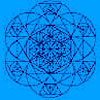 |
Geometry of seven interconnected circles, the Seed of Life is
considered to be the basic unit of information necessary for the
formation of all material substance. In this rendition, the Seed of
Life is superimposed over the geometry of an Ankh or Ansate cross,
an ancient Egyptian hieroglyph signifying life, health and
happiness. This cross has been extensively used in the symbolism of
the Coptic Christian church.
|
6. Electro Magnetic Field of the Human Merkaba |
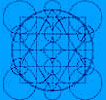 |
The Star Tetrahedron (a three dimensional Star of David) is the sacred
geometry at the center of this form and is the pattern of the
etheric light grid that surrounds each human being. This grid is
called the Merkaba and it is an interdimensional vehicle used
initially to incarnate spirit into human bodily form. The Universal
energy of Love is the fuel for this vehicle.
|
7. Metatron’s Cube |
 |
One of the most important informational systems in the universe and
one of the basic creation patterns for all of existence. Within it
are found all five of the Platonic Solids, the ”building blocks” of
creation.
|
8. Decagon with a Pentagonal Star |
 |
The Decagon emerges from the pentagon and shares its self-generating
divine proportion, the golden mean. At the center of this design is
the Pentagonal Star, a powerful psychological icon symbolizing
excellence, authority and uprightness.
|
9. Golden Mean Spiral |
 |
The Golden Mean Spiral is the ideal and correlates to Source. It is
the symbol of life’s unfolding mysteries. With each revolution the
spiral reveals a complete cycle of evolution. It offers a wiser and
more all-encompassing perspective gleaned from growing by “learning
all angles” of each experience. With their continuous curves,
spirals are feminine in nature. Logarithmic spirals, like cochlea of
the inner ear, reveal the intimate relationship between the
harmonics of sound and geometry.
|
10. Harmonics of Music
and Thirteen Chakras |
 |
Like the Golden Mean Spiral, this geometric progression has no
beginning and no end. It is from the Harmonics of Music that all the
laws of physics can be derived, reveling the potent nature of this
form. Music is a powerful tool for opening the charkas. This
geometry artistically symbolizes this relationship, and as such, may
be a particularly good focus for meditation when listening to Enos
Dream.
|
11. Endless Knot |
 |
One of the eight sacred emblems of Tibetan Buddhism, this geometry
forms ten enclosures and symbolizes the endless cycle of death and
rebirth until illumination. (The core Buddhist insight underlying
this symbol is: addiction and aversion lead to delusion, which is
the ongoing source of all suffering.)
|
12. Sacred Heart |
 |
Is said to be primary source of spiritual intuition, and the seat of
true wisdom. The purpose of which is to illuminate, inspire and lead
the mind, rather than be controlled by the mind.
|
13. Sri Yantra |
 |
A geometric power symbol. The ancient yogis of India considered it to
be the most powerful of all known geometric power symbols.
Represents the geometric structure of the sound of creation - OM.
Meditation on the Sri Yantra will bring enlightenment and that all the
secrets of the universe will be revealed to the person who meditates
on it until its image is engraved in the mind. This form also has
the ability to focus, balance and increase the level of life force
energy.
The key is experiencing Sri Yantra as a “star gate” to the
Zero Point of Source from which all manifestation ultimately comes.
|



































